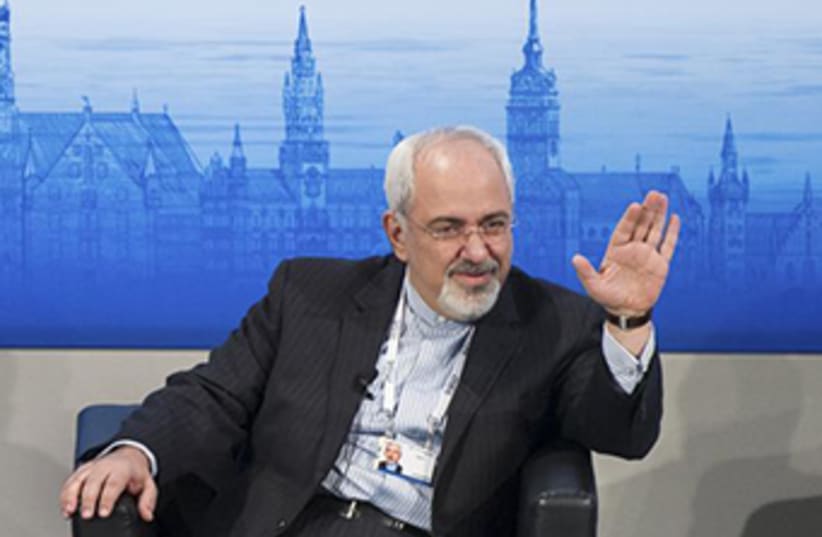WASHINGTON – US Secretary of State John Kerry held rare, private discussions with Iranian Foreign Minister Mohammad Javad Zarif on Sunday.
On the sidelines of a security conference in Munich, the two top diplomats discussed the next phase of negotiations over the Islamic Republic’s nuclear program.
The next round of talks, now oriented toward a comprehensive solution to the decade-old nuclear crisis, will take place in Vienna on February 18.
A senior State Department official said Kerry “made clear” to Zarif during the closed-door meeting “that the United States will continue to enforce existing sanctions.”
The official added that Kerry pressed Zarif on the importance of abiding by an interim deal that took effect last month.
That interim deal – formally known as the Joint Plan of Action – effectively caps Iran’s high-level nuclear work for six months in exchange for $7 billion in sanctions relief.
EU foreign policy chief Catherine Ashton, who coordinates the nuclear talks with Iran on behalf of the P5+1 – the United States, Russia, China, Britain, France and Germany – welcomed the bilateral meeting.
“It is incredibly important that as the international community now looks to build towards the comprehensive talks, that the dialogue is taking place and that we’re working out how to develop a comprehensive approach to this,” she told reporters in Munich.
Republican US Sen. John McCain sounded a cautious note, saying Iran had a long record of deception, and accusing Iran of cheating.
“[Iranian President Hassan] Rouhani bragged to one of his media outlets how he had deceived the Americans and negotiators when he was a negotiator,” he told the Munich conference.
“Construction [on a heavy-water reactor] continues around Arak, the centrifuges, 19,000 of them continue to spin, and most importantly implicit in this agreement is the right to enrich,” McCain said.
McCain is one of more than three-dozen Republicans in Congress who have joined 16 Democrats in support of a bill that would trigger sanctions tools against Iran, should negotiations fail to reach a comprehensive agreement within a year.
In a letter to Sen. Carl Levin dated January 26 obtained this week by Politico, former secretary of state Hillary Rodham Clinton said the sanctions legislation in Congress would “rob [the US] of the diplomatic high ground we worked so hard to reach, break the united international front we constructed, and in the long run, weaken pressure on Iran by opening the door for other countries to chart a different course.”
“If the world judges – rightly or wrongly – that negotiations have collapsed because of actions in the United States Congress,” Clinton continued, “even some of our closest partners abroad – to say nothing of countries like Russia and China – may well falter in their commitment.”
Zarif said at the conference on Sunday that it would be a “disaster for everybody” if the negotiations failed to achieve a lasting agreement.
But in a separate interview, Zarif said that Iran was not prepared to give up research on centrifuges, used to purify uranium, as part of a final nuclear deal.
“It’s just the beginning of the negotiations for a final agreement. It is the first step of the final step and I expect it to take some time,” he said. “We are ready because we believe it is in our interests and we have no other intention. So theoretically it shouldn’t be that difficult.”
“The detail may be a bit more difficult to achieve,” he added, “so we will see.”
